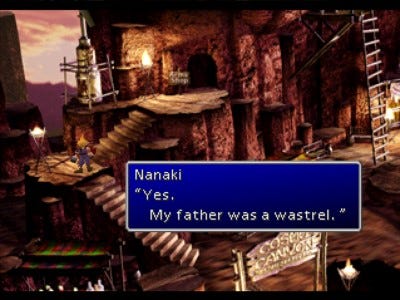Final Fantasy VII: select English v. Japanese comparisons (pt. 1)
Various dialogs from FF7, compared with the original Japanese
Final Fantasy VII’s translation gets a lot of criticism, and this series of posts will include some criticisms as well, so I want to start by saying that FF7’s translation is good. There are some mistranslations. There are spelling errors. There are a few things that should have been localized to English ways of speaking but weren’t. There are too many ellipses. It’s not superb. But overall, the translation has a lot of strengths that we didn’t get to see in earlier games. It’s at least as good as Woolsey’s famous SNES translations—better, in my opinion. And it’s much better than the things that had come before those, like FF4/2US.
Barret is over the top, but he has a distinct, consistent, entertaining personality and voice. So do most of the other characters. Compare to the translation of FF6/3US, where examples abound of characters losing their personalities. If you’re familiar with the game, consider where Celes accuses, “Only Edgar would say, ‘my lady’.” But Edgar’s speech quirk of using the English word lady was lost in translation, so Celes’ line comes off as totally random. Or think of how the game regularly forgets that Cyan is supposed to talk in Early Modern English.
Anyway, these screenshots are all from the original PSX version on emulator. Some of these lines might have been changed in the PC version.
English: “……Well, don’t know… getting help from a girl…”
Japanese: “……まあ、そうだとしても 女の力をかりるなんて…”
Translation: “Well, even if you’re right, Idunno about getting help from a woman.”
This is one where the dialogue looks weird but the translation is basically accurate. Cloud is being a sexist jerk, and it comes across. The problem is the ellipses. Japanese scripts use ellipses all over the place, and modern English localizations excise them. This line adds one.
English: “Hey boy! You shore got a good lookin’ heifer there!”
Japanese: “おっ! そこのにいさん!べっぴんさん連れてるねぇ”
Translation: “Oh! Hey fella! Got yourself a hottie, eh?”
I think the original translation’s great. The man speaks with an accent and is disrespectful in a couple of ways. “Heifer” as a rude way to refer to a woman is an interesting choice I wouldn’t have thought of. It’s grown to mean an overweight woman, but that’s relatively new. I never mistook that for the meaning, here.
English: “Do you wanna join my ‘Young bubby’s’ group?”
Japanese: “ムッキーの青春サークルに入らないかい?”
Translation: “Don’t you want to join my Young Brawnies club?”
Bubby works fine. ムキムキ (mukimuki) is slang that means muscular or brawny. The man says ムッキー (mukkii), which is a cutesy (I guess) abbreviation.
I was curious what word spook came from. The answer is バケモノ (bakemono), written in katakana rather than kanji. It means goblin, monster, or ghost. Good localization.
English: “I’m going, going, going, gone!”
Japanese: “オレはいくぜ オレはいくぜ! オレはいくぜ!!”
Barret literally says “I go, I go, I go” in a forceful way. I think the original translation is perfect.
English: “Get off your spikey butt and let’s go, Cloud!”
Japanese: “こうしちゃいられねえ。行こうぜ、CLOUD!”
Translation: “Enough sitting around. Let’s go, Cloud!”
Yeah, spikey butt is an invention. The original English is trying to handle two things. One, the JP uses the verb こうする (kousuru), which means to have freedom to do things because you’ve got nothing better to do. Fine to translate as sitting around or wasting time. Two, he tells Cloud to go in a forceful way. I’m so happy they went with get off your spikey butt.
English: “Ahhh…… You look like a bear wearing a marshmallow.”
Japanese: “ああ…マシュマロかぶったクマみたいでぴったりだったな”
Translation: Ahh… It was just like a bear wearing a marshmallow.”
Yessssss! It’s in the original! This game rules.
English: “Ummgah! It’s full capacity at present, so I’m afraid I can’t let you enter.”
Japanese: “んが!今は定員いっぱいなので中には入れてあげられません”
There’s no reason to bother with my own translation because I’d say the same thing as the original. The only weird thing is translating んが (nga) as Ummgah, which sounds like a caveman yell. This is supposed to be a surprised interjection, and I would have gone with something like gah! or oh!
Anyway, this dude really does tell you that this big, sparsely populated town is at capacity. Sometimes you might think something is a mistranslation when really this game is just weird.
English: “Yes. My father was a wastrel.”
Japanese: “ああ。父は見下げたふぬけ野郎だ”
Translation: “Yeah. My father was a contemptible coward.”
Red’s dialogue is even harsher than my translation because he ends it all with 野郎 (yarou), which is frequently translated as bastard or asshole1. It’s too many insults for English, and shortening to wastrel is a good idea, though you lose a bit of Red’s passion. Again, they found a word I wouldn’t have thought of.
More to come, and if there’s any line you’re curious about, let me know. I have a copy of the entire script in Japanese and English.
Or, in the case of Final Fantasy VIII, as wuss. Yes, the infamous chicken-wuss is チキン野郎 (chikin yarou).












